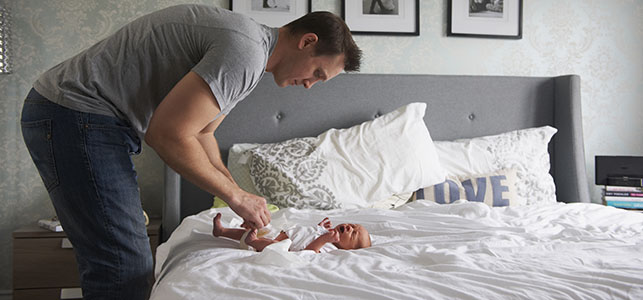
Whether your baby has been in the neonatal intensive care unit for a couple days or many months, you’re likely ready to have your whole family home at last! When a baby is born prematurely – or with complex health needs requiring care in the NICU – there’s a lot to consider about when and how to safely head home from the hospital. The great news is that our care team is here to help.
We look for several milestones before discharging a baby from the NICU. Generally, these include maintaining body temperature, meeting feeding goals and steadily gaining weight, and having stable breathing and heart rate. There may be other criteria specific to your baby. We’ll also want to make sure you’re comfortable caring for your baby safely at home. Your NICU team will provide instruction and plenty of opportunities for practice and questions.
This is an important question. Check the car seat packaging/manual for the weight range it can safely accommodate. Many rear-facing car seats are designed for babies from 5 to 40 pounds, but there are several that fit a baby as small as 3 to 4 pounds. Car seats that meet U.S. federal safety standards have everything they need to keep your baby safe. Avoid adding padding or other materials, which can push baby’s head forward and restrict breathing. We’ll do a car seat test before you leave the NICU to make sure your baby is positioned properly and can breathe safely. Car seat safety will continue to be important as your child grows.
Many of the systems in a premature baby’s body may not be fully developed by the time they go home from the hospital, including their immune system. We encourage feeding breast milk when possible. The antibodies will provide a level of protection from germs and illness. Your baby will likely receive some immunizations before leaving the hospital. Keep up with their pediatrician visits and vaccinations to help them continue building immunity.
Taking care of a baby is tiring! Before family and friends pitch in to help – or even just stop by for a visit – it’s important they receive their flu, COVID and Tdap (tetanus, diphtheria and pertussis) vaccines to prevent the spread of these illnesses to baby. They should also wash their hands before touching baby and hold off on visiting if they’re not feeling well. There are plenty of ways loved ones can lighten the load that don’t involve directly caring for baby too, like running errands or spending quality time with siblings.
This is something we’ll talk about in the weeks and days leading up to discharge. If your baby needs oxygen or other specialized equipment at home, we’ll help you get and practice using it so you’re comfortable before going home.
Babies should have their own sleep space with a firm, flat mattress. While they shouldn’t sleep in your bed (to avoid falls or suffocation), keeping their crib or bassinet in your room for the first six months can help you keep an eye on them and make breastfeeding easier. It’s also essential to keep their sleep space free from blankets, pillows, stuffed animals or other items that could cover their face and impair breathing. Babies should be placed on their backs to sleep. Dr. Tiffany Kimbrough has additional advice for helping babies – and parents – get quality, safe sleep.
Your baby will be on a feeding schedule in the NICU to make sure they’re getting enough nutrients and gaining weight. When first going home, stick to a similar schedule or follow other specific instructions given by the care team. Your pediatrician will track baby’s growth at regular follow-up visits and provide guidance on any changes that should be made. They’ll likely ask about your baby’s dirty diapers as part of determining proper nourishment, so it’s helpful to keep track of those – or at least make a note of anything out of the ordinary. It’s not unusual for babies drinking breast milk to poop several times a day.
Even prior to discharge, the NICU team will be working with you to make you comfortable taking care of your baby. While we won’t be physically by your side once your family goes home, there are plenty of people at the ready to support your little one’s ongoing health and development. Your baby’s pediatrician is the best resource for everyday concerns and questions. You’ll have regular appointments to check in on feeding, growth and overall health. Many NICU graduates – from any NICU throughout Virginia – can also benefit from our Neonatal Continuing Care Program, which is designed to track and nurture babies’ health, growth and developmental needs for the first two years of life. This is something we’ll talk about before baby is discharged from the NICU. We also have a team of pediatric subspecialists at CHoR, from speech pathologists to cardiologists and ophthalmologists, to help with specific health needs your baby may have now and as they grow.
Your health as a parent/caregiver is important too! Be sure to stay nourished and tell your doctor if you’re feeling overwhelmed, anxious or depressed.
It's normal to have some apprehension when it’s time to leave the 24/7 care of doctors and nurses, but you’re ready and there are plenty of people prepared to help. Congratulations!